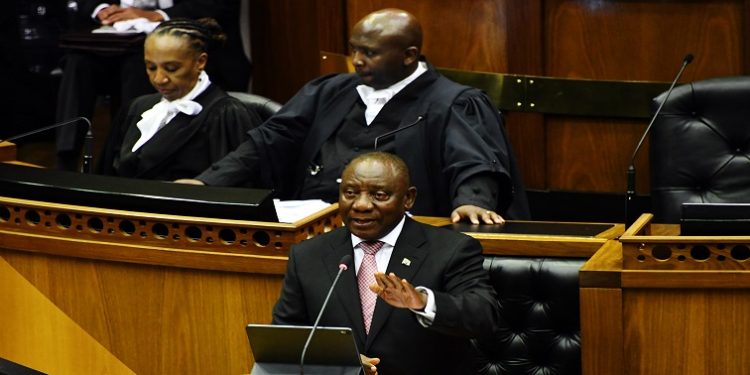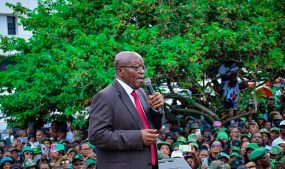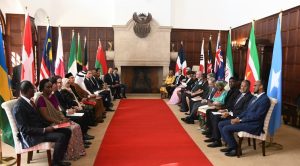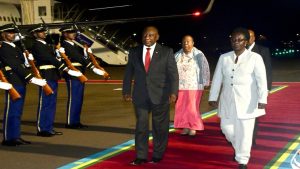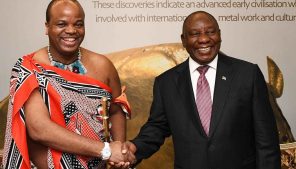As President Cyril Ramaphosa has only one day left to respond to the submissions made by some National Assembly members, he is the first President to face a preliminary assessment by a Section 89 Independent Panel in the terms of National Assembly Rule 129.
The new rule determines the various processes to be followed to remove a President from office. It was developed in 2018 following a successful Constitutional Court challenge by the EFF versus the former National Assembly Speaker Baleka Mbete in December 2017. Other parties that joined the EFF court bid were the UDM, COPE and the DA.
The ConCourt had ruled that failure by the National Assembly to make rules to regulate the removal of a President in terms of Section 89 (1) of the Constitution constitutes a violation of the section and declared it invalid. At the time, the parties wanted former President Jacob Zuma to be held accountable for violation of the Constitution for failure to implement the Public Protector’s Nkandla remedial action into the security upgrades.
Rule 129 developed in 2018
Previously, the National Assembly Rules only made provision for the removal process if a President is removed in terms of a Vote of No Confidence, provided for in Section 102 of the Constitution.
However, a rule had to be developed to make similar provision if a President is removed in terms of Section 89. It was on 29 December 2017 when the ConCourt ordered the National Assembly put removal procedures in place whenever a Member of the Assembly invokes Section 89 of the Constitution to remove a President from office.
The African Transformations Movement (ATM) has successfully invoked Rule 129 (A) to initiate a process in terms of Section 89 of the Constitution. The ATM draft substantive motion was approved by National Assembly Speaker Nosiviwe Mapisa-Nqakula who then had to refer the motion to an independent panel for assessment and also informed the President about the motion as provided for in Rule 129 (C).
The three-member panel, which has been appointed by the Speaker, is tasked to assess the ATM motion and evidence on whether the President has a case to answer on Constitutional grounds. The Constitutional grounds to remove a President in terms of Section 89 (1) are serious violation of the Constitution or the law, serious misconduct or inability to perform the functions of office.
In terms of the ATM motion, President Ramaphosa is possibly facing serious violation of the law and serious misconduct. This relates to the scandal following the alleged theft of millions of US dollars from his Phala Phala game farm in Limpopo more than two years ago. The President allegedly concealed the theft.
The Section 89 Independent Panel is expected to conclude its work within thirty days before submitting its report to the Speaker. It already started its work on 19 October 2022.
The panel gave members of the National Assembly, who wished to make submissions, to do so from 22 to 27 October 2022. The ATM, Economic Freedom Fighters (EFF) and the United Democratic Movement (UDM) are among the parties that have made submissions.
This was followed by giving President Ramaphosa ten days within which to respond to all the submissions. The President’s ten-day period started on 28 of October and will end on Sunday 6 November 2022.
Resign if no new information is submitted to the panel – ATM
ATM National Spokesperson Sibusiso Mncwabe says the party hopes that President Ramaphosa will meet the deadline.
“Well as the ATM, there is nothing new that we are expecting from Mr Ramaphosa in this Phala Phala matter. We just hope and believe that he will not try to frustrate this process by asking for further extensions as he did with other state institutions like Public Protector, the Reserve Bank and others. We want to see him stepping down if there is nothing new to say. We do not want this panel process to be frustrated in any manner. So, if there is nothing new to provide to the panel, we expect him to resign. That’s it”
However, the Presidency has confirmed twice this week that President Ramaphosa will meet the deadline. Presidential Spokesperson Vincent Magwenya reiterated this during a media briefing in Parliament on Friday.
” As you know the rules don’t ask for direct face to face engagement. But President will make the deadline. The details of the submission will probably be made public when the panel concludes its work”, Magwenya told the media in Parliament.
President Ramaphosa doesn’t feel undermined by noise over Phala Phala: Magwenya
As soon as President Ramaphosa has responded to all the submitted information by Sunday, the panel is expected to start considering all the information over a ten-day period starting on Monday 7 to the 17 November. During its assessment, the panel says it will also conduct any additional research required and also deliberate on the facts. It will also write and finalise its report within the ten-day period.
The report will then be submitted to the Speaker still within the thirty-day period. The report will indicate if there is prima facie evidence for President Ramaphosa to face a Section 89 Inquiry or not.
Report to the National Assembly and removal
Once the Speaker has received the panel’s report with the findings and recommendations, she must urgently bring it before the National Assembly for consideration as provided for in National Assembly Rule 129 (I)(1).
The President must also be informed on when the report will be scheduled for the House to consider and the decision on the report as required in terms of Rule 129 (I) (2).
If the Assembly takes a resolution that the President should face a Section 89 Inquiry, a Section 89 Committee will be established as required in term of Rule 129 (J). The Section 89 Inquiry will be similar to the Section 194 Inquiry which suspended Public Protectors Busisiwe Mkhwebane is currently facing.
In both cases, the National Assembly will have the final say of whether Mkhwebane or President Ramaphosa should be removed from office, if the President will also face an inquiry.
Two thirds majority votes in the Assembly would be needed to remove President Ramaphosa or Mkhwebane from office if the Section 89 and Section 194 committees recommend their removal from office after the inquiries.


